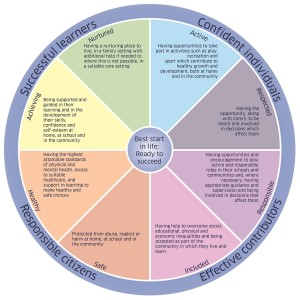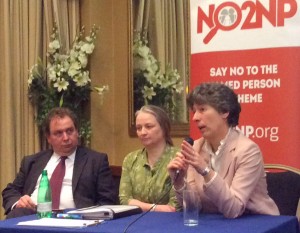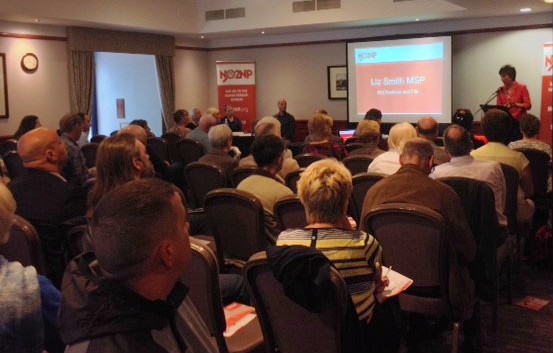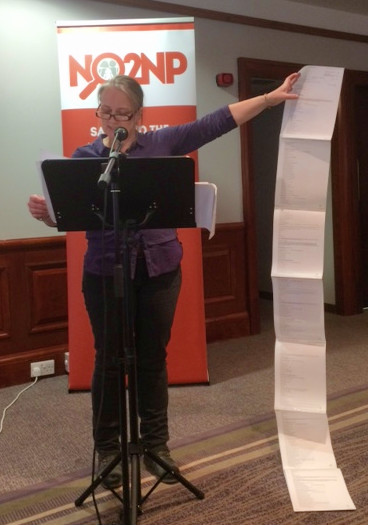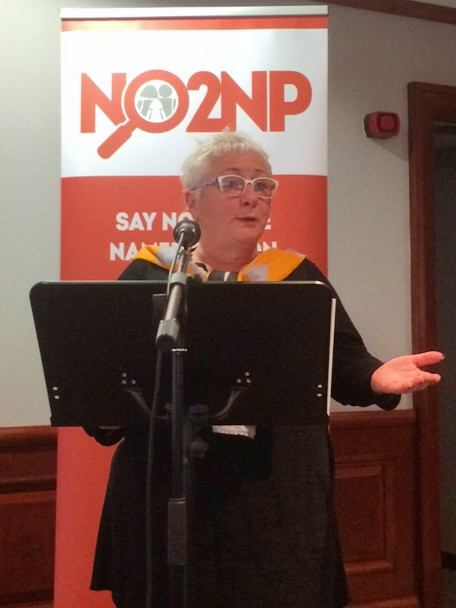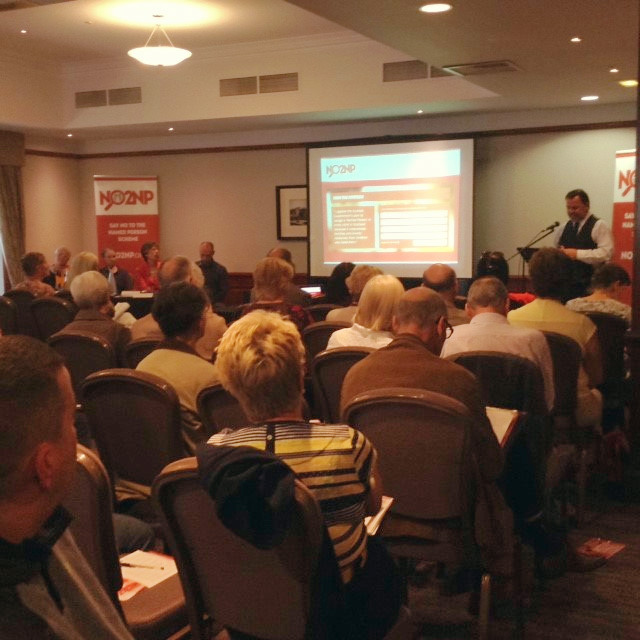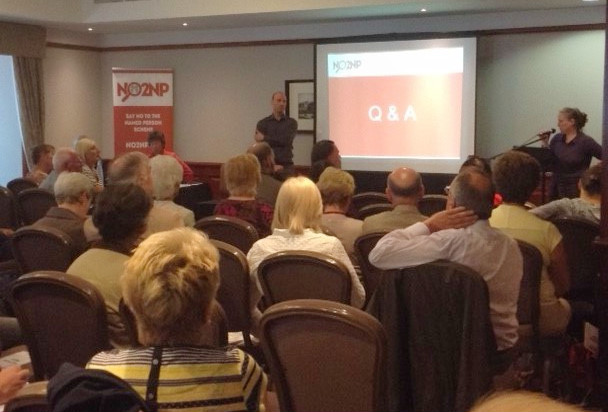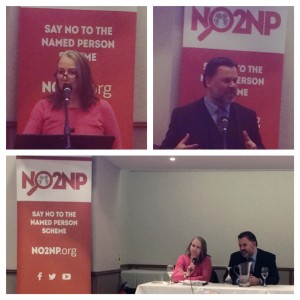Blog
Keeping you up to date on the progress of the Named Person scheme and the NO2NP campaign.
NO2NP ROADSHOW: DUNFERMLINE
Posted 10 years agoThe latest stop for the NO2NP Roadshow on Tuesday night was the Pitbauchlie House Hotel in Dunfermline, where a good number of local folk came out to listen to our panel of speakers share their concerns about the scheme.
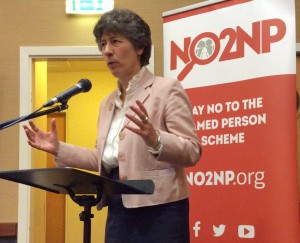
Fresh from a Holyrood debate, Mid Scotland and Fife MSP Liz Smith opened the evening’s talks by saying that she has never had as large a mailbag in her time as an MSP than on this issue. She said her opposition to the scheme was based on two fundamental objections: firstly, it is quite simply wrong to undermine parents with a universal scheme like this; and secondly, the fact that it will inevitably take away scarce resources from truly vulnerable children is quite simply inexcusable. The expense of the scheme across Scotland will be huge, she continued, and added that “the more people learn what is being demanded of families, the more they are in open rebellion against it.”
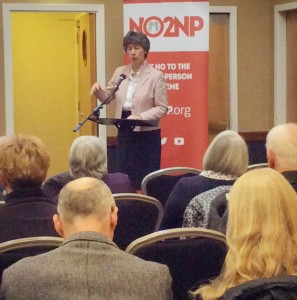
Liz then explained the passage of the Children and Young People (Scotland) Bill through Parliament and, while she had proposed around 40 amendments to it, Labour MSPs only supported her amendment to reduce the upper age limit for Named Persons from 18 down to 16. The SNP had whipped their MSPs to vote against all amendments, so they narrowly defeated that particular amendment by their Parliamentary majority. Despite having enthusiastically voted for the Named Person scheme, the MSPs in favour of it have now “gone very quiet”, she said.
The full extent of its reach into families is only now becoming apparent, as schools and health visitors are starting to explain its ramifications. Liz finished by saying that the scheme was “dangerous, really dangerous” and urged everyone to spread the message of the NO2NP campaign as much as they could.
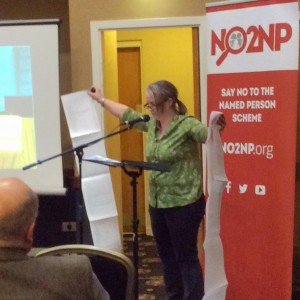
Next up was Lesley Scott from TYMES Trust, who said there seemed to be some confusion in the minds of the judges who heard the appeal of our Judicial Review last September. They had said in their judgment that ‘A Named Person is not assigned to a child or young person as such but “made available, in relation to” him or her.’ This statement, Lesley explained, carries the inference that the Named Person “provision” represents one-way traffic, that it is always parents and families who will approach the Named Person for assistance and support if they need it; however, during a discussion about the scheme on Radio Scotland’s Kaye Adams Programme last October, a teacher who is already a Named Person in Highland stated that “absolutely” she can “be pro-active” and go to each family. When challenged about what she would do if a family did not want her involvement, she replied “then it would be my job to convince them that I’m there to help, that we were working together as a unit.”
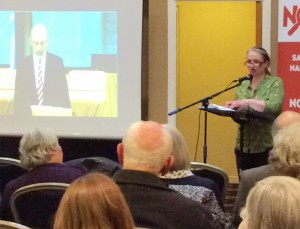
Lesley went on to say that, while there is no accepted, universally used definition of ‘wellbeing’, if the Named Person’s statutory duties hinge upon assessing it, questions must arise over which definition will be used in practice. She then showed a video clip of an exchange in a recent Holyrood debate, where SNP MSP Stewart Maxwell was challenged to define ‘wellbeing’, but simply ridiculed the question and did not give any kind of answer!
To highlight the difficulty, Lesley said that “researchers in the field of ‘wellbeing’ concede that ‘it is a contested concept’ with ‘a wide variety of definitions’”. Yet, she went on, wellbeing is now the ‘measure’ by which we are all being judged and if found wanting we “can expect intervention from the state.”
Gordon Macdonald from CARE then summarised the campaign’s three main objections to the Named Person scheme: it is universal and not in any way either optional or focussed on truly vulnerable children; the concepts of welfare and wellbeing are conflated, so that the scheme is about far more than identifying and helping vulnerable children; and the current threshold for sharing data without consent has been lowered from “strictly necessary” to “appropriate to fulfil the Named Person’s responsibilities”.
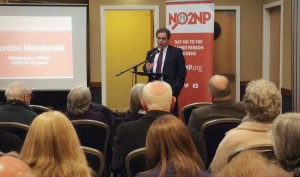
Gordon went on to explain how the legislation had been an attempt to enshrine the principles of the United Nations Charter on the Rights of the Child (UNCRC), but that this had been done in a very selective way that omitted reference to the importance of parents and families for a child’s wellbeing.
Gordon went on to say that the fact the final Bill had been a joining of a children’s services bill and a children’s rights bill was reflected in things like the SHANARRI indicators, where child protection issues (Safe, Healthy) were conflated with children’s rights issues (Respected, Included) and general wellbeing issues (Achieving, Nurtured, Active, Responsible).
Nigel Kenny from The Christian Institute then shared some practical points, before an in depth Q&A, where mothers in the audience expressed outrage that this was happening and that parents were basically being kept in the dark about the true nature of the intrusive scheme. Several people signed up to be volunteers and we already have commitments to deliver thousands of NO2NP flyers around Dunfermline to get the message out. Thanks to everyone for helping us in this way!
Some of these volunteers will be in Dunfermline town centre this Saturday to encourage local folk to sign the online petition – if you live in the area and would like to join them, get in touch with us on volunteers@no2np.org
NO2NP ROADSHOW: EDINBURGH
Posted 11 years agoThe large Salisbury Suite at the Macdonald Holyrood Hotel in Edinburgh was nearly filled to capacity on Tuesday morning for the first NO2NP Roadshow event since the summer break.
Dr Stuart Waiton of Abertay University in Dundee opened the meeting by saying that the autonomy of the family was being undermined by social policy across the board, with an overemphasis on “early intervention” by professionals to sort out children’s problems.
Liz Smith MSP then spoke about the huge mailbag she had received from people concerned about the scheme, which she says destroys the trust between families and professionals that is essential in bringing up a child.
She said that the scheme was “repugnant” and a “badly mistaken policy” that “diminishes resources”. The volume of support for the NO2NP campaign is growing all the time, with almost 12,000 people having now signed the petition. The appeal of the campaign “goes well beyond party politics” and the breadth of political views of those involved in it was “a good thing”.
She also pointed out that the bureaucracy of running the scheme would be enormous and too difficult to put into practice. The scheme has been “mis-sold” by the Government and the responses that concerned citizens have received have been “inaccurate” and “patronising”, she said. The Government, who are telling people how to live their lives, has not been shown in a good light, she added. In closing, Liz urged people to get involved, as it is “such an important campaign”.
Next up was Lesley Scott, Scottish representative for The Young ME Sufferers (TYMES) Trust.
She picked apart the three main arguments that have been used by the Scottish Government to justify the scheme:
1. “We’re doing all we can to help vulnerable children”
2. “We’re just formalising what we’ve been doing for ages”
3. “And Parents have asked for it.”
Lesley pointed out, firstly, that the word “vulnerable” does not appear anywhere in the legislation or the Government’s guidance and that their own QC admitted in the recent appeal case heard in the Inner House that every child is seen as potentially vulnerable. The corollary of this is that every parent is therefore viewed as potentially negligent or abusive. This will have a significant impact on how parents will be viewed and treated. If children, parents and associated adults do not agree with all of the Named Person’s views, then they will be treated as “non-engaging”: the balance has shifted dangerously in favour of the state.
The next argument – that local authorities are simply formalising what they have already been doing – has not been reflected in the attitudes of the professionals tasked with administering it, only a minority of whom think they currently have the capacity to gain an accurate and deep understanding of how to provide it.
And the contention that parents asked for the scheme is misleading at best, as parents with disabled children in the Highland region asked for a single, voluntary point of contact for accessing services. But that is not what they have got with the legislation and any success in the Highland Pathfinder has been shown to be down to other causes than the GIRFEC approach.
Lesley concluded by saying that the Government’s “disjointed excuses are shown to be a smokescreen and the true purpose of the legislation comes into view; it is a transfer of authority from your family to the state – an assault on the autonomous family unit”.
After a compelling new campaign video was shown, independent social work consultant Maggie Mellon spoke about her opposition to the scheme. She said that “parents are responsible for children’s upbringing, not services”, and that it is a very easy thing for professionals to display prejudice, when they don’t have the full picture. Civil servants have driven through this legislation but they haven’t thought through how dangerous it will be. People thought that they were getting a single point of contact, but that’s not what the legislation says. It doesn’t give parents or children the right to be consulted, as the Named Person is to take action “where he or she considers it to be appropriate to promote, support or safeguard the wellbeing of the child or young person”.
Commenting on the enormity of the universal scheme, Maggie remarked that “you can’t get all the sand on the beach through a little sieve”. A head teacher of a primary school isn’t going to have the time or the knowledge to explain your child’s needs to a range of professionals. Maggie said that she is against the Named Person scheme because “it’s wrong and it will cause damage”.
She said we should use the threat of compulsion far less than we do. She commented: “There’s too much compulsion and not enough compassion”. The Act moves the threshold from “at risk of significant harm” to “any concern about anything that might present a risk to a child’s wellbeing”. Instead of addressing the real needs of children, it is sinister surveillance. It’s not a point of contact for families to access services, she said, but a point for those services to access children. It’s as if the state is saying “We’re central, you’re peripheral”.
Nigel Kenny from The Christian Institute finished the formal session by taking everyone through the Action Packs that had been prepared for the meeting, before the usual lively Q&A finished off the meeting.
The next stop for the NO2NP Roadshow will be Glasgow on Monday 14th September at the Couper Institute, 86 Clarkston Road at 7.30pm – hope to see you there!
POLICE SCOTLAND RAISES CONCERNS ABOUT NAMED PERSON PLANS
Posted 11 years agoScotland’s national police force has warned about a “lack of clarity” in the Named Person plans and highlighted complications surrounding the sharing of sensitive information.
Police Scotland said the new law would also have “cost implications” and raised fears about the forces capacity to cope with the demands of overseeing the scheme.
Chief Superintendent Alan Waddell, one of the forces most senior police officers, raised the concerns in a formal submission to the Scottish Police Authority’s corporate risk register.
Waddell said there may not be “efficient or secure systems” in place to “manage wellbeing concerns” and also warned that such “significant change for all authorities including Police Scotland” could make it harder to identify at risk children.
He added that Police Scotland’s “confidence and reputation may be negatively impacted” due to the lack of clarity about what the force’s role would be in presiding over the scheme.
Waddell said: “There is a lack of clarity as to the expectations, roles and responsibilities; therefore it is unknown at this time if current systems, models and process in PSoS [Police Scotland] can support this legislative change.”
Commenting on the issue of sharing of sensitive information he said: “Police Scotland does not currently have a consistent process on how such risk and concerns are identified, triaged managed and shared.
“In the absence of a national functioning Named Person Service, there is a concern that partners do not have efficient or secure systems in place to receive and manage such notifications.”
Waddell also highlighted the inconsistency that youngsters will have Named Persons until they are 18, but then many will be dealt with by adult courts as opposed to the children’s hearing system.
Waddell said: “This is a significant change for all authorities, including PS and requires a review of all interdependent policies and processes which impact/refer to children and young people to ensure cognisance of legislative change.”
The officer leading on public protection issues, Detective Chief Superintendent Lesley Boal, stressed that the force did not oppose the legislation and that they were looking at ways of overcoming complications detailed in the risk register.
NO2NP supporter, Liz Smith MSP, said the intervention from Police Scotland showed the force was “very sceptical” about the Named Person scheme.
She said it was extremely concerning and telling that “the very organisations who are supposed to make the policy work are now very sceptical that it can work in practice”.
“It’s just another example of why the Named Person nonsense which is peddled by the Scottish Government flies in the face of common sense.
“It is very clear now that the SNP scheme lacks guidance and showcases just how sinister the policy is with the named person having too much power.”
Sources:
Police highlight ‘concerns’ over how to implement SNPs controversial Named Persons scheme, 02 July 2015
Police Scotland criticise SNP Named Person plans, 02 July 2015
Parents could be reported for not giving kids enough ‘love, hope and spirituality’
Posted 11 years agoThe top civil servant behind the Named Person scheme has suggested parents could be reported to state officials if judged to be showing their child inadequate levels of ‘love, hope and spirituality’.
Bob Fraser, the Getting it Right for Every Child health adviser in the Scottish Government’s Better Life Chances unit, explained his latest thinking at a conference of childcare workers.
He argued it was about all children and not just “the usual suspects” who are already known to social services.
He said: “Every child deserves to have positive well-being. We have had suggestions of different indicators, of love, hope and spirituality. I am not wedded. The Act is there at the moment. But in a few years, if people feel it is right, they should change that.”
A spokesman for NO2NP said: “This is a dark, deeply worrying and insidious development. Apparently the named person will police family life according to some ever-shifting ‘happiness index’. It’s an impossible standard for parents to measure up to.”
Liz Smith MSP, a vocal opponent of the plans, said: “This is exactly the sort of nonsense which critics of the named person scheme feared would happen.
“Parents will be horrified at the suggestion of being targeted because a state guardian doesn’t regard their home as sufficiently spiritual.”
Sources:
Scottish Daily Express, 01 June 2015
Scottish Daily Mail, 31 May 2015
NO2NP Roadshow: Elgin highlights
Posted 11 years agoThe campaign saw strong support in Elgin last night as concerned parents and individuals, with some traveling quite a distance, turned out for the latest NO2NP Roadshow.
Nigel Kenny of The Christian Institute explained that the campaign was made up of a broad coalition of organisations and individuals from academia, charities, education, medicine, politics and social work. He said all those involved have a shared concern for the importance and autonomy of the family in raising the next generation.
Videos were shown, the first explaining the background to the campaign, and the second from First Minister’s Questions last week, when NO2NP supporter Liz Smith MSP challenged Nicola Sturgeon over Clan (Community Law Advice Network) Childlaw’s concerns about data sharing.
Lesley Scott from Tymes Trust then spoke about the blueprint for every child’s life that has been planned under the GIRFEC (Getting It Right For Every Child) model, including the Wellbeing Wheel, the My World Triangle and the Resilience Matrix. She pointed out that Edinburgh University had identified no fewer than 304 outcomes that could arise from the SHANARRI “wellbeing” indicators.
Nigel finished off the talks with an update on the judicial review appeal (due to be heard in Edinburgh on 3rd and 4th June) and some tips on how people can get involved with the campaign.
There was a lively and extended Q&A at the end, where people expressed their deep concerns about the negative impact that the scheme will have on families, schools and society at large.
The NO2NP Roadshow will be stopping off at Falkirk next on Wednesday 27th May, when we’ll be at the Best Western Park Hotel in Camelon Road at 7.30pm. Hope to see you there if you live in and around the area!
NO2NP Roadshow update: Dunfermline, Cumbernauld
Posted 11 years agoDr Stuart Waiton (Abertay University) was in the chair for a very well attended NO2NP roadshow at the Carnegie Conference Centre, Dunfermline on Wednesday 11 February.
Dr Waiton reiterated his view that child safety policy isn’t rational and that it is spiralling out of control. He described the potential for intervention as “astronomical”.
The first speaker was prominent NO2NP supporter, Liz Smith, who is an MSP for Mid Scotland & Fife. She explained her two fundamental objections to the named person scheme. First, the lack of trust in families and the fact that parents don’t want someone to tell them what to do. Second, that the focus of resources must be the vulnerable children who need help, not a universal service. She said that the legislation is “wrong” and the named person scheme is “unworkable”.
Next up was Lesley Scott, spokesperson for Tymes (Young ME sufferers) Trust – one of the organisations behind the recent judicial review of the legislation. She noted that the named person scheme is universal with no opt-out.
The next NO2NP roadshow takes place in CUMBERNAULD (Westerwood Hotel) on Thursday 26 February at 7:30pm. Speakers will include community paediatrician Dr Jenny Cunningham and Lesley Scott of Tymes Trust.
NO2NP Roadshow review: Aberdeen & Irvine
Posted 11 years agoThe two latest outings of the popular NO2NP roadshow were in Aberdeen on 15th October and Irvine, North Ayrshire on 23rd October.
At the Aberdeen meeting, supporters heard from Liz Smith MSP, Young People spokesperson for the Scottish Conservatives. She described the named person policy as “slightly sinister” and argued that resources would be diverted away from the most vulnerable, hence defeating the purpose of the policy. She also said it was ridiculous that children aged over 16, who were recognised as adults, still required a named person.
Next up was Maggie Mellon, a consultant and writer on social work and children/family issues. She said that government shouldn’t get involved in parenting, and lamented a preoccupation with risk and safety.
The audience were also addressed by Lesley Scott, representing Tymes Trust, who work with children suffering from ME. She said it was unclear what will happen when parents and the authorities disagree and that it would be a “minefield” for parents who choose not to engage. She also explained that the threshold for intervention had been lowered from risk of significant harm to the ‘SHANARRI’ indicators.
In the chair for the evening was Dr Stuart Waiton, a sociologist from Abertay University, Dundee, who expressed his concern that children may go to their named person to complain about their parents and that the authority of parents and families could be undermined.
The meeting in Irvine was addressed by Glasgow-based community paediatrician, Dr Jenny Cunningham, who explained that every child in Scotland would be assessed through the ‘SHANARRI’ indicators and that the legislation would oblige all health, education and social work professionals to identify any deficiencies in parenting and to arrange intervention. She also spoke of her concern about the impact of the named person on family life and said that parents were intimidated by the idea.
The next talk was given by Anne Cannon, a Glasgow-based mother of five, who said her two main concerns with the named person policy were the negative impact it would have on the relationship between parents and state agencies, and the fact that it would fail the very people the policy is meant to help.
The meeting was also addressed by local man, Councillor Tom Marshall, who sits on North Ayrshire Council. He spoke about the appalling ‘ChildrenCount’ surveys which have been operating in North Ayrshire and outlined some of the questions being asked of youngsters.
The next stop for the NO2NP roadshow will be PERTH (Salutation Hotel) on 12th November at 7:30pm, followed by MONTROSE (Park Hotel) on 26th November at 7:30pm. We hope to see you there.
NO2NP roadshow visits Stirling
Posted 11 years agoThe No to Named Persons (NO2NP) roadshow arrived in Stirling on Friday 29th August for the third instalment of the current tour.
The lunch time meeting, held in a city centre hotel, was once again well attended and included a feisty and informative question and answer session with the speakers.
In the chair was Dundee-based sociologist, Dr Stuart Waiton, who told the audience: “To have a universal provision seems very problematic to me.”
As in Dundee two nights earlier, the subject of the controversial child wellbeing surveys being conducted in three Scottish local authorities – known as ‘ChildrenCount’ – was raised. Alison Preuss of Schoolhouse, the home education group who are backing NO2NP, said: “It’s not about child protection. It’s about gathering information.”
The main speaker was Liz Smith MSP, who represents Mid Scotland & Fife (which includes Stirling) at Holyrood. She told the audience: “I am fundamentally opposed to this named person policy. It is morally wrong. There is this assumption that you can’t be trusted. I find this deeply unnerving.”
The meeting also heard from Falkirk-based father of four, James McIntosh, who was recently told by the local health board, NHS Forth Valley, that a named person had already been allocated for his children – albeit he was never informed who the named person actually was. Mr McIntosh said: “One size fits all doesn’t work…In the Bill there isn’t a single mention of the parent”.
NO2NP roadshow visits Dundee…as ‘ChildrenCount’ survey rolled out in city
Posted 12 years agoThe second instalment of the NO2NP roadshow took place on the evening of Wednesday 27th August in Dundee city centre. Around 50 campaigners and members of the public gathered to hear the powerful case against the Scottish Government’s named person policy.
A particular focus of discussion on the night was the troubling new ‘ChildrenCount’ surveys currently being rolled out in Dundee, details of which (including links to the surveys themselves) can be found here: Improving Children’s Outcomes
The meeting was chaired by Dr Stuart Waiton, a sociologist based at nearby Abertay University.
The main speaker of the evening was Liz Smith MSP, who spearheaded the opposition to the named person policy during the passage of the legislation through Holyrood. She said:
“It grates on me that somebody else, appointed by the State, is responsible for your child. The vast majority of parents do not need to be told by the government how to look after their family. I don’t think parents want this and I don’t think they know it’s happening.”
Speaking about the oft-cited pilot scheme in the Highlands, she added: “I don’t see the compelling evidence that in Highland Council this has actually worked.”
The meeting was also addressed by Lesley Scott of Tymes Trust, who work with young ME sufferers. She made clear that parents who refuse to engage with the system will inevitably find that action will be taken against them and explained that: “a named person is allowed to access your child’s confidential records.”
The NO2NP roadshow moves on to Stirling on Friday 29th August, then Inverness on 1st October. More details can be found here.






